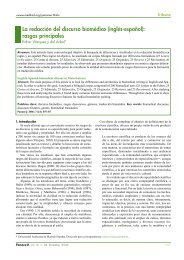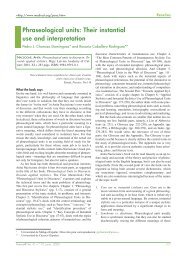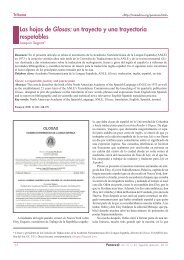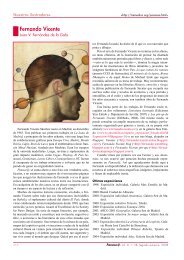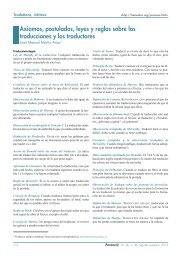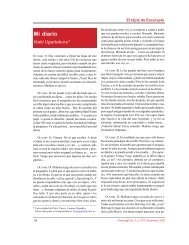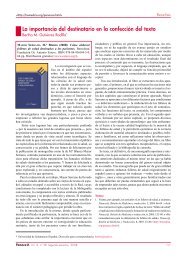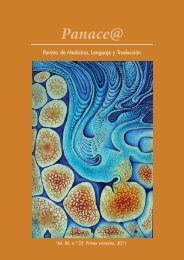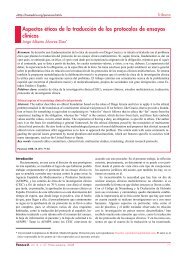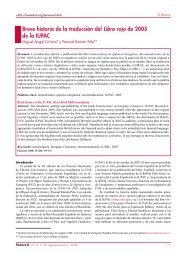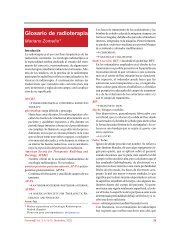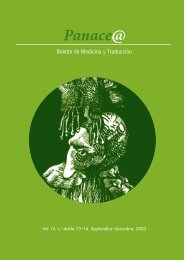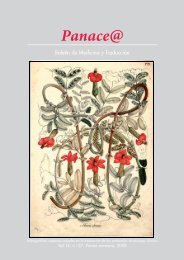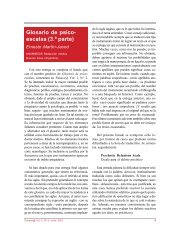Vol. 1, n.º 2. Diciembre del 2000
Vol. 1, n.º 2. Diciembre del 2000
Vol. 1, n.º 2. Diciembre del 2000
Create successful ePaper yourself
Turn your PDF publications into a flip-book with our unique Google optimized e-Paper software.
El plumero<br />
Fernando A. Navarro<br />
Servicio de Traducción,<br />
Laboratorios Roche, Basilea (Suiza)<br />
Hace ya casi cuarenta años, cuando muchos<br />
medtraderos eran muy chiquitines o no habían nacido<br />
siquiera, Alexander Gode mantuvo durante<br />
años, bajo el título genérico de «Just words», una<br />
serie sobre lenguaje médico en The Journal of the<br />
American Medical Association (JAMA). A primera<br />
vista, se trataba de una serie sin grandes pretensiones,<br />
en forma de notas breves de prosa <strong>del</strong>iciosa<br />
sobre los aspectos más variopintos de la<br />
amplia superficie de contacto entre medicina y lenguaje.<br />
Lo que hace de ellas un auténtico tesoro para<br />
el traductor es, sin duda alguna, la formación enci-<br />
1. Interlingua es le latino moderne con un vocabulario international<br />
e un grammatica simple. Interlingua es comprensibile a prime vista<br />
per personas qui son familiar con le vocabulario pan-occidental.<br />
clopédica <strong>del</strong> autor y su extraordinaria capacidad<br />
para ir más allá de los vocablos concretos, trascender<br />
el provincialismo característico de muchos<br />
autores de lengua inglesa, y abrir los ojos <strong>del</strong> lector<br />
a cuestiones universales e intemporales. Buen<br />
ejemplo de ello es la nota que desempolvo hoy con<br />
el plumero. Gode aprovecha un neologismo en apariencia<br />
intrascendente, calciphylaxis, que podría<br />
haber sido cualquier otro, para esbozar en pocas<br />
líneas uno de los problemas centrales de la neología:<br />
el de la internacionalidad de los tecnicismos<br />
grecolatinos frente a la fugacidad y opacidad de<br />
muchos tecnicismos locales. No cabe duda de que<br />
mantener durante años una serie periódica <strong>del</strong> interés<br />
de estas just words no es en absoluto tarea<br />
sencilla. Pero es que este Gode fue, desde luego,<br />
un personaje singular donde los hubiera. Polígloto<br />
e impulsor infatigable de la interlingua 1 , catedrático<br />
de lenguas románicas y alemán en las universidades<br />
de Columbia y Chicago, Alexander Gode<br />
(1907-1970) es hoy más recordado como cofundador<br />
y primer presidente de la ATA (Asociación<br />
Estadounidense de Traductores.<br />
Calciphylaxis<br />
If I were asked “Where does the word ‘calciphylaxis’ come from?”, I would answer “Montreal”. This, I assume,<br />
would result in the further question as to where Montreal (or, more specifically, Hans Seyle) got it, which question<br />
leads to a more interesting line of observation and argument.<br />
The elements in “calciphylaxis” are Latin and Greek, but neither the Romans nor the Greeks had the word, nor<br />
could they have understood it. Since we know it originated in the head of Hans Seyle (a place excelling, linguistically<br />
and otherwise, by its system of multiple crops), we might take our query straight to the source, asking about origins<br />
where the origin occurred. But even Hans Seyle cannot know whether the word was conceived in French or English<br />
or German..., for the very question is wrong! “Calciphylaxis” is one of those thousands and thousands of words<br />
which from their very beginning are simultaneously French and English and German and Italian and Spanish, and so<br />
forth. “Nansen-passport words” I call them. Though we may come across them for the first time in an English setting<br />
(or French or German...), we know right off that no more than a slight rearrangement of their spelling garb is required<br />
to make them feel equally at home in any other language of the Western world.<br />
The frequency of the Nansen words must not be allowed to dull our appreciation of their remarkable nature. They both<br />
symbolize and promote the intellectual unity of the Western world which persists over and beyond all its remarkable<br />
divergencies. The phenomenon is unique. I know of nothing quite like it in the history of human thought and human<br />
speech.<br />
And now a concluding footnote: I chose the example of Seyle’s “calciphylaxis” because Seyle is also responsible for<br />
the medical term “stress”, which is English and nothing but English, and the rendering of which in other languages, within<br />
and without the Western community, has been accomplished only at great expense of argument, hot temper, and ill will<br />
(with the somewhat anticlimactic final result that the French now have “le stress”, the Germans “der Stress”, and so<br />
forth).<br />
To my ear the sound of “stress” is much more pleasing than that of “calciphylaxis”. But “calciphylaxis” is a citizen of<br />
the world, while stress is an Anglo-Saxon who travels abroad (not always succeeding in making friends).<br />
A. Gode: Just words. JAMA, 1962; 183: 810.<br />
Panace@ <strong>Vol</strong>. 1, No. <strong>2.</strong> <strong>Diciembre</strong>, <strong>2000</strong>



